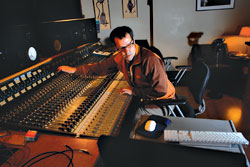As I pull up outside of Chroma Sound studios on 15th Avenue West, I notice an old crosswalk sign posted above the main door. Presumably functioning as a clever and convenient way to let visitors know “Tape is rolling, hang back” or “It’s all cool, come on in,” the sign is presently offering a steadily glowing, dissuasive red hand. I remain in my car, staring at the light, afraid I’ll miss my opportunity for entry.
After about 10 minutes, I wonder if I’m reading far too much into the red hand. Maybe it’s just a nifty piece of vintage signage they hung for the hell of it? Still, I’m apprehensive, simply because I know that on the other side of the door, local producer Johnny Sangster is working with two very special out-of-town guests: Danish avant-garde keyboardist Søren Kjærgaard and multimedia artist Torben Ulrich.
I tug on the door, and Sangster swings it open, grinning warmly and inviting me in. “I’m not so good at remembering to turn off that sign,” he apologizes when I tell him about my hesitation. “Just doing a little playback here,” says Sangster, offering me a seat and introductions to Kjærgaard and Ulrich. Kjærgaard is a handsome and charismatic blond Dane, while Ulrich is slight, with an impressively long, silver beard and a sweet, gracious demeanor. I’m relieved about the latter, as would be anyone who saw Metallica’s 2004 documentary, Some Kind of Monster. After watching Ulrich slam the latest work of his son Lars while cameras rolled and suggest that he “delete it all,” I wasn’t sure what to expect when I walked into the studio. I certainly didn’t expect to see Ulrich reading Burroughs-style poetry cut-ups while rattling marbles around in a metal bowl.
However, the mood and tasks at hand in Chroma that night were an accurate (if somewhat atypical) study in what’s made 41-year-old Seattle native Sangster an increasingly popular producer for a wide variety of musicians. He naturally relaxes artists, and he’s not afraid of experimentation, welcoming everyone from back-to-the-garage punks like the Fucking Eagles and the Whore Moans to improv-oriented arts acts like Bird Show of North America or pop ingenues Smoosh with equally opened-minded ease.
Though his initial exposure to studio work was as a curious, musically inclined exchange student living in Denmark in the early ’90s, it wasn’t until he returned to Seattle in 1997 and connected with Egg Studio owner Conrad Uno that his advanced tape op-ing future began to take shape. “I asked him if I could run the sessions while he was at the baseball game,” laughs Sangster as we chat over potent cocktails at Ballard’s Smoke Shop after the Ulrich session has wrapped. Since Uno is a rabid Mariners fan, his protégé had ample opportunity to learn. “I’m totally indebted to Conrad for letting me cut my teeth as an engineer there,” he continues. The first record he worked on was the Posies’ Failure, and his career trajectory from there on out was anything but, as he helmed recordings for a staggering list of notable locals including Mudhoney, Gas Huffer, the Fallouts, the Kent 3, and the Briefs. He also credits Uno for instilling his priority for helping musicians feel safe and respected. “I think just being personally interested is important, really,” he says. “Make sure people can hear what they need to hear, and focus on each of the band members’ needs individually. Make them feel like you’re taking their concerns seriously. Because it’s ultimately their record.”
Whore Moans drummer Jason Kilgor, who has been assisting Sangster in the studio on a few recent sessions, affirms this successful strategy. “A big reason why people love recording with him is because they never feel like they’re being judged or shaped into something they’re not,” Kilgor explains. “If a producer takes control in the studio, they often lose the artist’s trust. People are open to Johnny’s suggestions because they know he won’t compromise their needs.”
Empathetic listening skills are crucial, but what ultimately distinguishes a producer is the signature sound he’s known for, and with Sangster, that’s clearly a knack for capturing unfiltered, punk passion, but finishing it with pop edges that improve its listenability without diminishing its human vigor. It’s a sound you can hear in all his work, and one that his elder peers have come to admire. “Johnny has a kind of instinctive garage-pop feel in his work that I really enjoy,” says Jack Endino. “It’s always raw and honest, never too slick. And you should hear him sing harmonies!”
For the next few weeks, we’ll be devoting this page to profiling some of the best producers the city has to offer. The cross section of producers we chose is by no means complete, nor was it intended to be.








